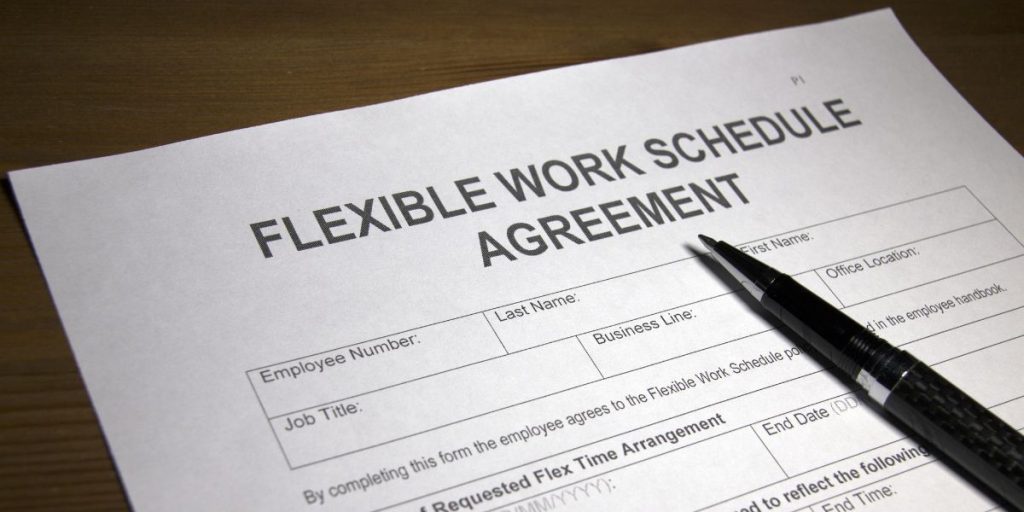
Starting December, there will be a significant shift in the employment landscape in Singapore, as all employers will be obliged to establish a formal process for employees to request flexible work arrangements, according to a new set of tripartite guidelines. These guidelines aim to address the growing need for flexible work arrangements in Singapore’s evolving workforce.
Table of Contents
Why Flexible Work Arrangements (FWA) are Crucial in Singapore?

These progressive guidelines were initiated in response to the government’s acceptance of all the recommendations proposed by a specially appointed tripartite workgroup, which was established with the aim of exploring the implications and feasibility of flexible work arrangements.
The workgroup was spearheaded by the Minister of State for Manpower, assistant secretary-general of the National Trades Union Congress (NTUC), and honorary secretary of the Singapore National Employers Federation (SNEF). It consulted with a diverse range of stakeholders to ensure a comprehensive understanding of the issue:
- Companies of various sizes
- Trade associations
- Labour unions
- Community organisations
The forthcoming guidelines for flexible work arrangements (FWA) in Singapore are being driven largely by the country’s current labour market conditions. As the Minister of State for Manpower, Gan Siow Huang, pointed out in a dialogue on the Tripartite Guidelines on Flexible Work Arrangement Requests, an increasing number of people are assuming caregiving responsibilities.
She mentioned, “Singapore has an ageing population. We know that more and more of us will be caregivers, at some point. It is our duty to create an environment that is supportive so that those people who want to work can continue to work, even while they are managing other family duties at home.”
This critical shift in labour market dynamics makes the implementation of FWA not just a matter of choice, but a crucial step to sustain a robust labour force in the country.
These new guidelines, slated for implementation later this year, will establish norms for employees to request flexibility in their work arrangements. Additionally, they will encourage employers to grant these requests based on business needs.
When Will Singapore’s New Flexible Work Arrangement Guidelines Take Effect?
Singapore’s new guidelines on flexible work arrangement requests are set to take effect on December 1, 2024. From this date, all employers in Singapore will be required to establish a formal process for employees to request flexible work arrangements.
These new guidelines will establish norms for employees to request flexibility in their work arrangements. Additionally, they will encourage employers to grant these requests based on business needs.
When do I Need to Request Flexible Work Arrangements?

1. Parenting Responsibilities
Parents, especially those with young children, may benefit from FWA as they often need to balance work with childcare responsibilities. This could include dropping off or picking up children from school, attending parent-teacher meetings, or caring for a sick child.
Also Read: NDP Rally 2024: 10-Weeks Shared Parental Leave & Jobseeker Supports
2. Elderly Care
Individuals who are responsible for the care of elderly family members may need to attend medical appointments, manage medication schedules, or simply provide companionship during the day. FWA can allow these individuals to meet these responsibilities without compromising their work.
3. Furthering Education
Employees who are pursuing further education, such as part-time degrees or professional certification courses, may need the flexibility to attend classes, study, or complete their assignments.
Also Read: What is Upskilling? Your Key to Career Advancement in Singapore
4. Health Conditions
Individuals with chronic health conditions often need to actively manage their health. This can involve regularly attending medical appointments for check-ups, treatments, or therapy sessions.
Furthermore, due to the nature of their conditions, they may require rest periods throughout the day to manage symptoms, recuperate energy, or take necessary medication. These rest periods can vary in length and frequency, depending on the specific health condition and severity. They are essential for maintaining the individual’s wellbeing and ability to perform work effectively.
What Are the Types of Flexible Work Arrangements in Singapore?

The new flexible work arrangements guidelines, effecting on December 1, 2024, apply to all employers and employees who have successfully completed their probation period. The guidelines have defined three distinct types of flexible work arrangements:
1. “Flexi-place” arrangements
These arrangements provide employees with the flexibility to work from locations other than the office, including options for telecommuting and working from home.
2. “Flexi-time” arrangements
This FWA type offers employees the ability to work at varying timings without any alterations to their total work hours or workload. This encompasses staggered hours, flexible shifts, and a compressed work schedule.
3. “Flexi-load” arrangements
These arrangements allow employees to choose different workloads with corresponding pay. They include provisions for job sharing and part-time employment.
Formal vs Informal Requests: What You Need to Look Out for
The guidelines mainly address formal requests for flexible work arrangements. These long-term arrangements require careful planning to ensure the business operates smoothly.
Informal requests, such as an ad hoc arrangement to report to work later on a particular day, do not fall within the purview of these guidelines. The guidelines outline the basic requirements that need to be met for formal flexible work arrangement requests to be submitted and duly considered.
How to Make A Flexible Work Arrangement Request?

To initiate a flexible work arrangement, you must submit a formal request in writing. This should align with the protocols established by your organisation, which could involve the use of an HR portal, email, or other official channels. Your request should include the following specifics:
- Type of Flexible Work Arrangements:
This could include different forms such as opting for remote work, reducing the number of working hours, or requesting a lighter workload depending on your personal needs and circumstances.
❗Remember, opting for a lighter workload could also imply a corresponding reduction in salary, depending on the terms of the flexible work arrangement.
- Rationale for the arrangement:
Your request should clearly outline your reasons for wanting a change in your work structure, which could be personal commitments, health concerns, or any other factors necessitating greater work flexibility. - The frequency of the arrangement:
It’s important to clearly outline how often you would like to utilize the proposed flexible work arrangement. This means detailing if the arrangement is to be enacted on:- a daily basis (starting work two hours later every day)
- a weekly basis (such as working from home every Friday)
- or a monthly basis (like working half-days for the first week of every month)
- The proposed start and end dates:
Provide a clear timeline for when you would like the flexible work arrangement to start and when it would end. This helps the HR team to plan and avoid any misunderstanding.
Whilst the new guidelines primarily address formal requests, it doesn’t mean that informal discussions about flexible work arrangements are obsolete.
If previously, you had an impromptu chat with your supervisor about working from home on a day when you had a family commitment, and it was successful, such interactions can continue.
For example, if you find that you need to leave early one day for a personal matter, you can still have a casual conversation with your manager about adjusting your schedule for that particular day.
Next Steps After Making A Request
After your request submission, your supervisor will discuss it with you to reach a beneficial solution. This may require multiple discussions, especially for long-term plans. You’ll need the space to discuss changes to your pay and benefits, new expectations, and operational impacts.
Your employer should respond to your request within two months of receiving it. If the request is denied, employers are required to provide the reason in writing.
Grounds For Request Denial
Grounds for denying a flexible work arrangement request can include:
- Increased Costs: If the flexible work arrangement would significantly increase operational costs, it could be a valid reason for denial. This could include costs associated with equipment, infrastructure, or additional hiring to cover the flexible hours.
- Reduced Productivity: Employers may deny the request if they believe that the flexible work arrangement will lead to reduced productivity – including concerns about the employee’s ability to perform effectively outside of the traditional office setting.
- Need to Hire New Employee: Employers are required to take into account the financial and logistical impact when onboarding new employees. If the implementation of flexible work arrangements necessitates the hiring of additional personnel to fulfil your duties, this could constitute a valid reason for refusal.
Take note that, the company cannot deny your request simply because it doesn’t support remote work or flexible hours, or due to the organisation’s tradition or custom.
In case of a disagreement with your boss, you should attempt to resolve the workplace conflicts within the company. If necessary, your union can provide advice and assistance. Employers who disregard these guidelines may face corrective workshops or warnings issued by the Ministry of Manpower (MOM).
Final Words
Whilst Singapore’s new flexible work guidelines provide a structure for formal requests, maintaining open dialogue with your employers is crucial. As an employee, you should also take into account the effects on your team, proactively suggest solutions to anticipated obstacles, and take the initiative to ensure smoother negotiations and a higher likelihood of a positive outcome.
For job seekers interested in companies that offer flexible work arrangements, consulting with a reputable recruitment agency in Singapore can provide valuable insights into employers who are embracing these new guidelines. These agencies often have up-to-date information on companies’ policies and can help match candidates with employers that align with their work-life balance needs.
Also Read: Benefits of Recruitment Agencies: 5 Reasons to Use Them!
